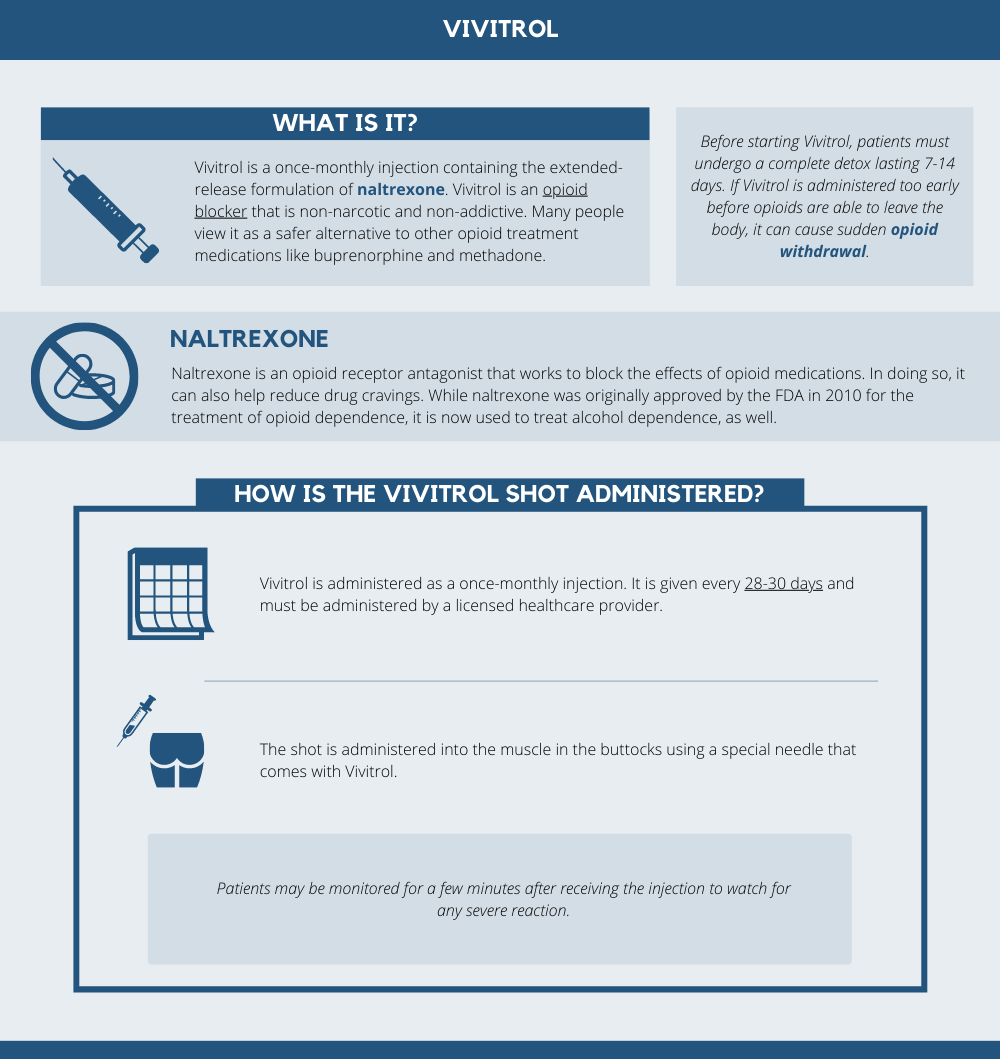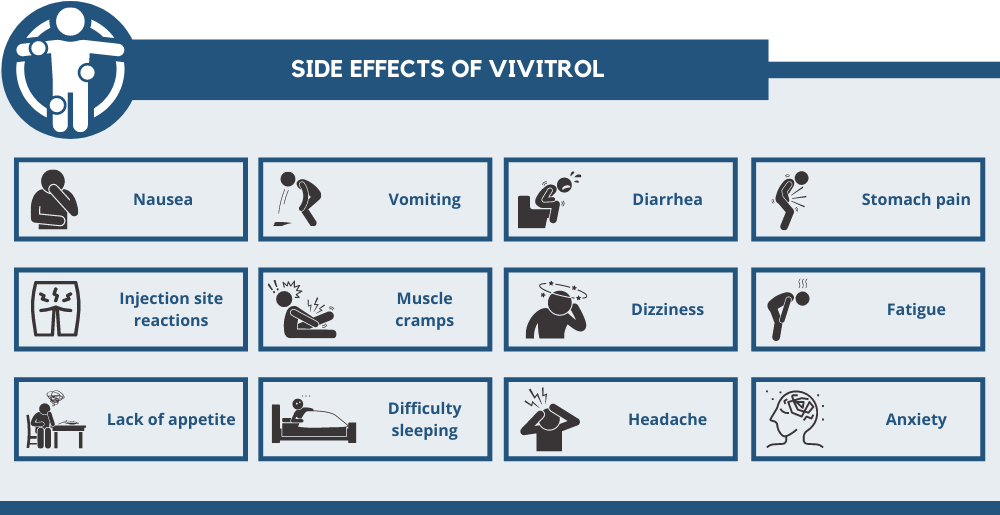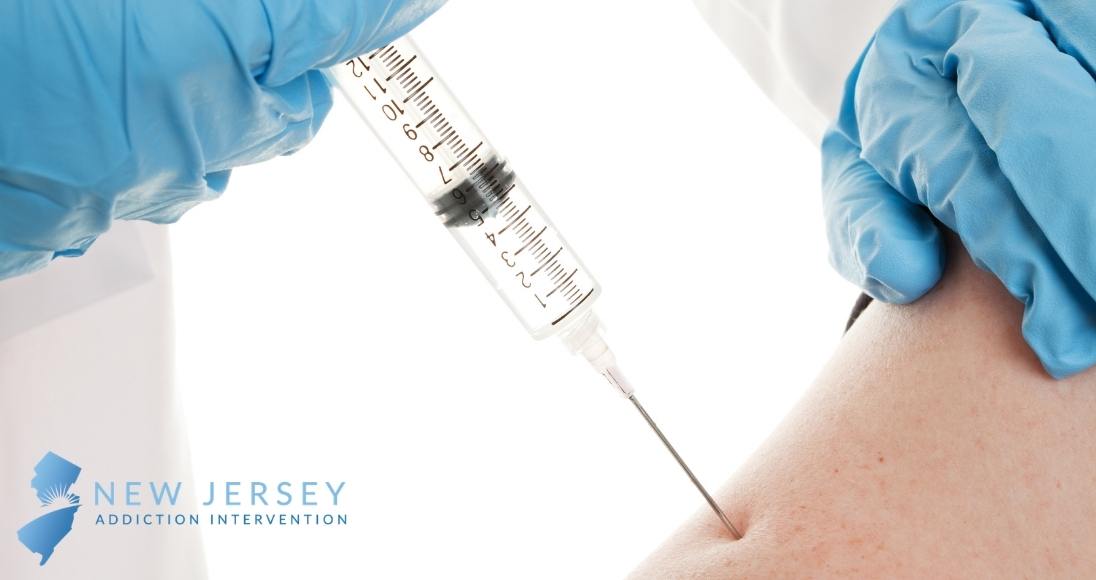Opioid and alcohol addiction are two of the most difficult addictions to overcome. Between the withdrawal symptoms that occur when you quit drinking or using opioids and the strong cravings that come later, getting sober isn’t easy. Vivitrol (naltrexone) is a medication that may be able to help.
Vivitrol treatment involves a monthly Vivitrol shot, behavioral therapy, and peer support. These three resources combined can help people avoid relapse.

What is Vivitrol?
Naltrexone is an opioid receptor antagonist medication that was originally approved by the FDA in 2010 to help treat opioid dependence. Today it may also be used to treat alcohol dependence. Naltrexone may come in various forms, including a pill that is taken on a daily basis or a monthly injection.
Vivitrol is an extended-release formulation of naltrexone that is administered once monthly via an intramuscular injection. Before patients can begin taking Vivitrol, they must abstain from using opioid drugs for at least 7 to 14 days. If it is administered too early, it can put people into sudden opioid withdrawal.[1]
If a person is being treated for alcohol dependence with Vivitrol, they must also stop drinking before starting Vivitrol. Naltrexone does not treat or reduce withdrawal symptoms – it can only help prevent cravings and relapse.
Vivitrol must be administered by a licensed healthcare professional. It is typically administered in the buttocks every 28 days. Naltrexone is not addictive or habit-forming, however, it must always be used in combination with counseling or a drug and alcohol treatment program.
How Does Vivitrol Work?
Vivitrol works by blocking the effects of opioids like heroin or prescription pain medications. In doing so, it partially binds to opioid receptors in the brain without activating them. This helps prevent drug and alcohol cravings, therefore, Vivitrol can help prevent relapse in people who are recovering from opioid or alcohol dependence.[2]
As an opioid antagonist, the medication also blocks opioid molecules from being able to attach to opioid receptors in the brain. This means that if a person uses opioids while on Vivitrol, he or she will not feel the euphoric effects of opioids. Since patients know they cannot get high while taking Vivitrol, the medication helps prevent relapse.
Vivitrol by itself is not meant to be a standalone treatment for opioid or alcohol addiction. Instead, physicians always recommend its use with behavioral therapy and/or a comprehensive substance abuse treatment program.
One clinical trial looked at the efficacy of Vivitrol in treating people with alcohol dependence. The study found that people who were on the Vivitrol shot had 25% fewer drinking days than people who had a placebo.[3]
Another study looked at the treatment of opioid dependence using Vivitrol and found that 36% of patients on Vivitrol stayed sober for 24 weeks, while only 23% of people taking the placebo stayed sober.[4]
Both of these studies suggest that, when used properly, Vivitrol can be very useful in the treatment of opioid and/or alcohol dependence.
Vivitrol Side Effects
Like any other prescription medication, Vivitrol (naltrexone) may cause mild to severe side effects. Some of the most common side effects of Vivitrol include:

- Nausea and vomiting
- Diarrhea
- Stomach pain
- Redness, swelling, or irritation at the injection site
- Muscle cramps
- Dizziness
- Fatigue
- Lack of appetite
- Difficulty sleeping
- Headache
- Anxiety
Most mild side effects will go away within a few days or weeks after taking Vivitrol.
Drug and Alcohol Treatment With Vivitrol
Vivitrol and other medications used in medication-assisted treatment programs are most effective when combined with a comprehensive addiction treatment program. A comprehensive treatment program will consist of:
- Medical and psychiatric care
- Group therapy
- Individual counseling
- Medication-management
- Support groups
- Aftercare
Throughout the course of treatment, the patient’s physician and therapist(s) should work together to help develop the best possible treatment plan that considers the patient’s individual needs.
People may remain on Vivitrol for varying lengths of time. The good news is that since Vivitrol is not habit-forming, patients will not experience withdrawal symptoms when they stop taking the medication like they would with Suboxone or Methadone.
The fact that Vivitrol is non-addictive and low-maintenance makes it a highly attractive treatment option for people recovering from opioid and/or alcohol addiction.
Find Vivitrol Treatment in New Jersey
Vivitrol is not right for everyone. However, even if it isn’t right for you, there are many other FDA-approved treatment medications that can help you overcome your addiction to alcohol or opioids. The first step you have to take is to reach out for help.
At New Jersey Addiction Interventions, our team is here to help you find addiction treatment that works. If you or a loved one are ready to get started on your recovery journey, pick up the phone and call now.
References:
Medically Reviewed: February 10, 2021

All of the information on this page has been reviewed and verified by a certified addiction professional.

